Leah Hunt Hendrix is a key leader in organizing the rich as part of progressive movements. She has co-founded two successful and important organizations, Solidaire and Way to Win, that engage wealthy donors and institutional funders to support multi-racial working class grassroots organizing, both in the streets and at the ballot box.
I have so much respect for Leah and the work she’s done. She’s taken risks, and been willing to be a public face for the radical rich, leveraging her personal story for the sake of moving more wealthy people like her towards justice, in the process helping build progressive movements that win.1 She’s led me, along with many wealthy people, to a deeper understanding and support of electoral organizing, and what’s needed to build political power. She is a historian, writer, strategist, and fundraiser along with being an incredibly effective, second generation organizer of the rich.
Over the past 12 years or so she’s become a dear colleague and friend, someone who I want you to know and learn from.
This is Part 1 of a conversation with Leah from March of this year, and has been edited for content and clarity.
MG: How did you come to participate in engaging wealthy people around social justice?
LHH: My mom's father started an oil company, Hunt Oil. My mom inherited a portion of that company and started receiving dividends from it in her 30’s and 40’s. With her sister Swanee, she started a foundation called, at first, The Hunt Alternatives Fund and then called The Sister Fund, which focused on women and girls.
Ever since I was little, I watched my mom work as a donor organizer.2 I wasn’t interested in philanthropy, but in my 20’s, I did start thinking about my class background. I was always interested in inequality, especially from having moved around and living in Manhattan and then also living in rural New Mexico. From a young age, I was really struck by inequality in America.
I found Resource Generation, where you were leading at that time, and that was very helpful in learning about class privilege. During those same years, I was in grad school studying political philosophy and I found Mark Randazzo, who was running the Funders Network on Trade and Globalization (FNTG).3 I was really interested in international affairs and political science, and I ended up going as part of a FNTG delegation to the World Social Forum. It was very inspiring and I learned a lot there about global grassroots struggles.
I decided to spend a few years living abroad, in the Middle East. I came back to work on my PhD, and pretty soon Occupy Wall Street started. I was interested in getting money out of politics at the time - the Supreme Court had recently ruled on Citizens United and I’d joined the board of an organization working to reverse that decision. So that interest, and the graduate work I was doing, which involved a study of democracy and social movements, made me want to go down to Occupy every day to listen and learn about the perspectives and strategies people had there… but I couldn't really figure out my role. As a wealthy person, it just felt wrong to be leading direct actions or doing something like that. I worked for a while in the Orientations Working group where I set up a welcome table. I thought that could be a good role for me. But then a friend was like, “You know, your role should be organizing rich people.” It wasn’t necessarily what I wanted to hear; it certainly didn’t sound like the most fun job, but it made sense.
As the Occupy movement began to wane, I was part of a small group of friends thinking about what we would do next. I was able to really hash out some ideas with them about what it would look like for me to do more funder and wealthy people organizing. I joined the Democracy Alliance, which was a kind of Clinton-era political donor community, not because I agreed with its ideology, but just to understand how political and funder organizing worked. And a group of us basically decided we're going to build something similar, but more aligned with a progressive orientation. We started calling this project Solidaire, and I began working on it with Farhad Ebrahimi and Billy Wimsatt. Billy was a huge support, it would not have happened without him. Billy taught me how to facilitate conference calls, how to make spreadsheets, how to follow-up with people and be an organizer. We started building this new group. About eight of us started having monthly dinners and hashing out what it would look like, how it would work. We created some initial bylaws of what would become Solidaire.
So that’s how it all started.
MG: What do you see as the lineage of your work organizing wealthy people? And who have been your mentors?
LHH: Definitely my mom. She showed me that this was actually a thing to do, and that it took a lot of work but could be really impactful and transformative for the people involved. I loved that her community was a lot of the people she organized with. That seemed very meaningful. Also, my Aunt Swanee and Tracy Gary. I always think of Tracy as the high mother of donor organizing. I learned a lot watching them all organize a movement of wealthy women donors that accompanied the women’s movement. They created foundations with cross-class boards, and an attention to the role of race. They were second wave feminists, in many ways, but my mom welcomed the “third wave” - in fact, the Third Wave Foundation (now Third Wave Fund), led by Amy Richards, Cat Gund, Rebecca Walker, Vivien Labaton and others, rented space in the Sister Fund’s office, so some of those women also became great mentors to me.
I don’t have as close of a relationship with Chuck Collins but I definitely have felt his presence holding this movement for a long time now. I also met Katrina Vanden Heuvel along the way, who was the editor and publisher of the Nation. She's such a brilliant organizer of ideas and a mentor for me.
MG: What are you most proud of from your work organizing the wealthy?
LL: I'm really proud of having built two organizations that continue to exist and thrive without me leading them.
Solidaire is going really strong and has great leadership, with Vini Bhansali at the helm. Solidaire set out to be in close alignment with emerging movements, and we’ve been able to accompany many activists and organizers working on climate justice, on immigrant rights, reproductive rights, and racial justice. For example, I remember giving my credit card info to a friend who’d gone to Ferguson in response to the killing of Michael Brown, and splitting some of the costs for some of the protests (like sound equipment and bail funds) with other Solidaire members, before there was a 501c3 to donate to.
One of the things I think we did well from the beginning was build a self-organizing model inside of the community, especially around rapid response funding. The Solidaire rapid response listserv became this vibrant, participatory space. I really felt like that created a lot of leaders. Solidaire became very leaderful and we set the tone for that when we started it. We would have monthly dinners and every time a member of the community would present their theory of change and explain how they were trying to orient their lives. To be a member, you had to have a certain set of values and commitments around race, gender, sexuality, class, and prioritizing the agency of those most impacted. But beyond that, we want to hear what you think and what groups and strategies you're interested in. I think not having it be overly top down, and having a culture where everyone felt valued, was really positive.
With the other group I co-founded, Way to Win, it's been a pretty different model. It is an organization where the staff builds a strategy alongside our movement partners. The thinking is more that, sure, you can let a lot of flowers bloom, but there is a limited amount of money and we live in a very cutthroat political system where you have got to be really focused and strategic to win in the electoral context.
We were seeing major strategic errors and challenges to building progressive power, like progressives running against each other in primaries, and enabling more conservative candidates to win. That’s a problem. We felt like somebody has got to get control of that because we were wasting a lot of energy, money and talent beating each other rather than actually making progress.
Thankfully, the intervention we were a part of, with many others, is working. Way to Win and Movement Voter Project and other sister organizations have helped shepherd in a swelling of the ranks of progressive leaders in political office, and have popularized the idea that political funding is not just about supporting candidates every two years, but also about building lasting infrastructure in communities that can do electoral work and political organizing year-round, every year.
Some folks were skeptical about my pivot to electoral politics, but to me it is a crucial part of the ecosystem of movement work.
Can I just give a quick tangent of a story that I read recently that speaks to why it's so important to have movement-aligned people in political office?
I've been reading Saul Alinsky's book on John Lewis4, the Labor leader who started the CIO in the 1930s. The big, initial fight that opened the floodgates for organizing workers in America was at General Motors in Detroit. There was a governor, Frank Murphy, who was overseeing the negotiations between John Lewis and the General Motors leadership.
The workers had occupied the factory, they were doing a “sit-down strike,” and the court came in and said to the workers, “This is illegal. You're trespassing. You need to leave the factory.” John Lewis went to the Governor and told him, “Governor Murphy, we know you're on our side. Please don't enforce this.” Murphy replied, “It's my job. I am on your side, but it's my job as governor to enforce the law and the court’s decisions.”
But he didn't end up doing it! He stalled, General Motors gave up their anti-union campaign, and that was why the workers won. I think it’s a really important story about why you need political allies in office for these movements to succeed. You need the movements but it's not enough if the people in office, who can call in the national guard, are not on your side.
I feel proud of having built Solidaire to support the movements that were bubbling up from the ground and then built Way to Win to try to support the political strategies to get movement-aligned people into political office. I feel like I've contributed to strengthening and fleshing out the ecosystem of progressive power.
MG: In organizing the wealthy towards justice and equity, what perspectives or tools have you found most useful?
LHH: One on ones! I think one on ones are so important. Spending time getting to know people, hearing about their passions, what they're interested in, is crucial.
I got more and more burnt out and more drained the more I was focused solely on fundraising. The focus on fundraising sapped the life out of me. I always need to spend time pouring back into the relationships, outside of any financial asks. And to remember that, while moving the money is what the organizations need most in the short term, doing the slow work of transforming ourselves as individuals and communities who will do this work, and keep doing it, for the long term, is also crucial. That’s the difference between fundraising and real organizing.
Secondly, the power of peer to peer organizing. This work is easier being able to talk about my own experience with our family company. It is absolutely classism, yes, but because I come from a wealthy family, I’m allowed into different spaces and conversations than my peers from other class backgrounds. Knowing I have a similar class experience, that I know the complexities that come with having family wealth, creates a kind of trust. It’s true of any kind of organizing - it’s helpful to be able to relate to the people you’re working with, and the problems they struggle with, whether those are financial, because of lack of resources, or emotional, related to the guilt and confusion of having too much. It’s important to know who we are most easily able to connect with and move, so that we can each find our right role and unique organizing superpower. Just like white people should take responsibility for organizing white people around racial justice, wealthy people can take responsibility for organizing each other around economic justice. I’m proud of the way I’ve been able to organize other wealthy people as part of multi-racial working class movements. I want more wealthy people trained and supported to become peer organizers.
Those are the top two that come to mind.
At the end of the day, it’s all about relationships and community. I feel like people stayed in Solidaire because they kept meeting more and more interesting people who became their real friends. Not just colleagues, friends.
I know the close relationships I got to build through Solidaire and Way to Win, with movement leaders, organizers and wealthy donors, are a big part of what has kept me in this work.
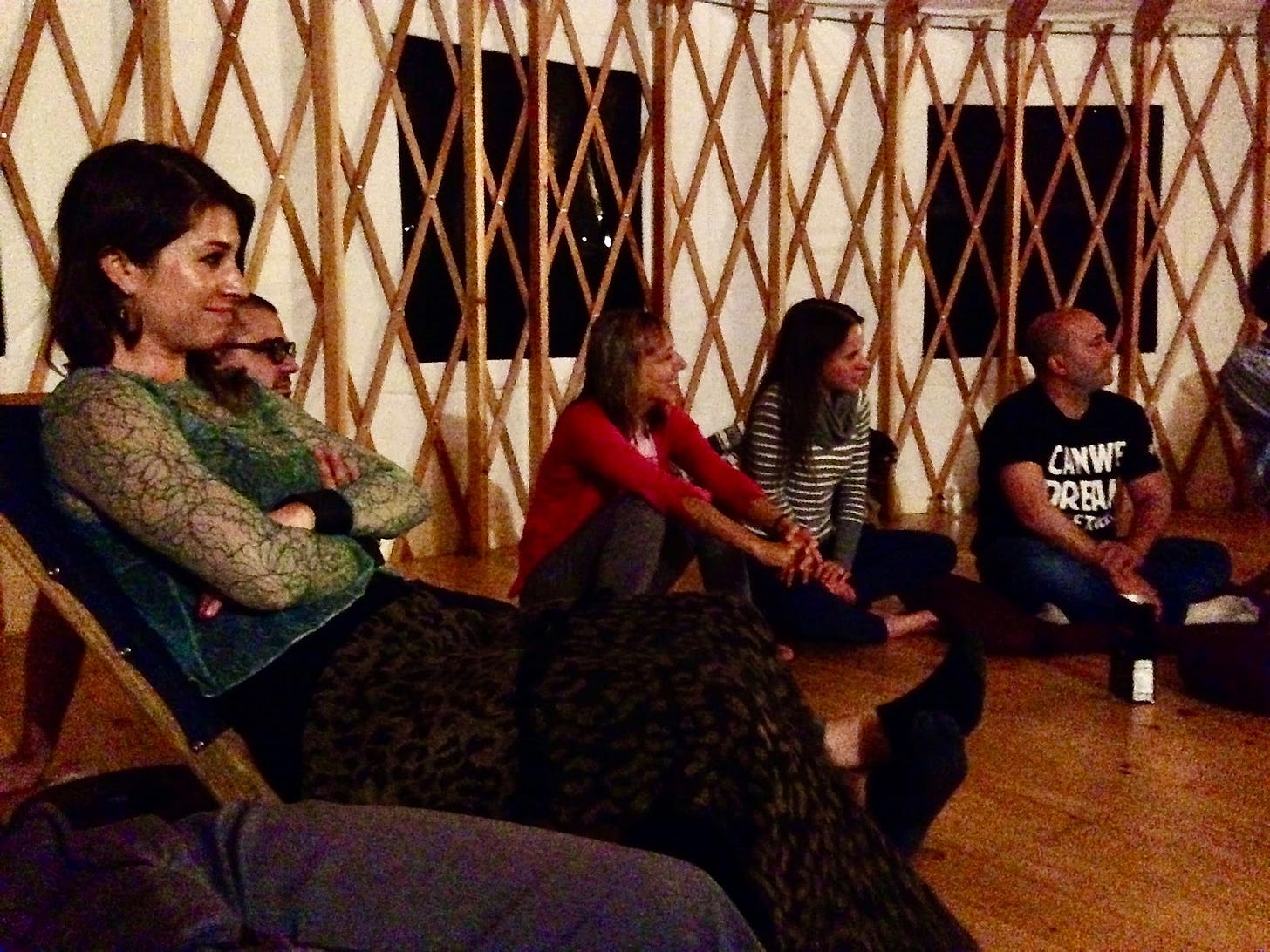
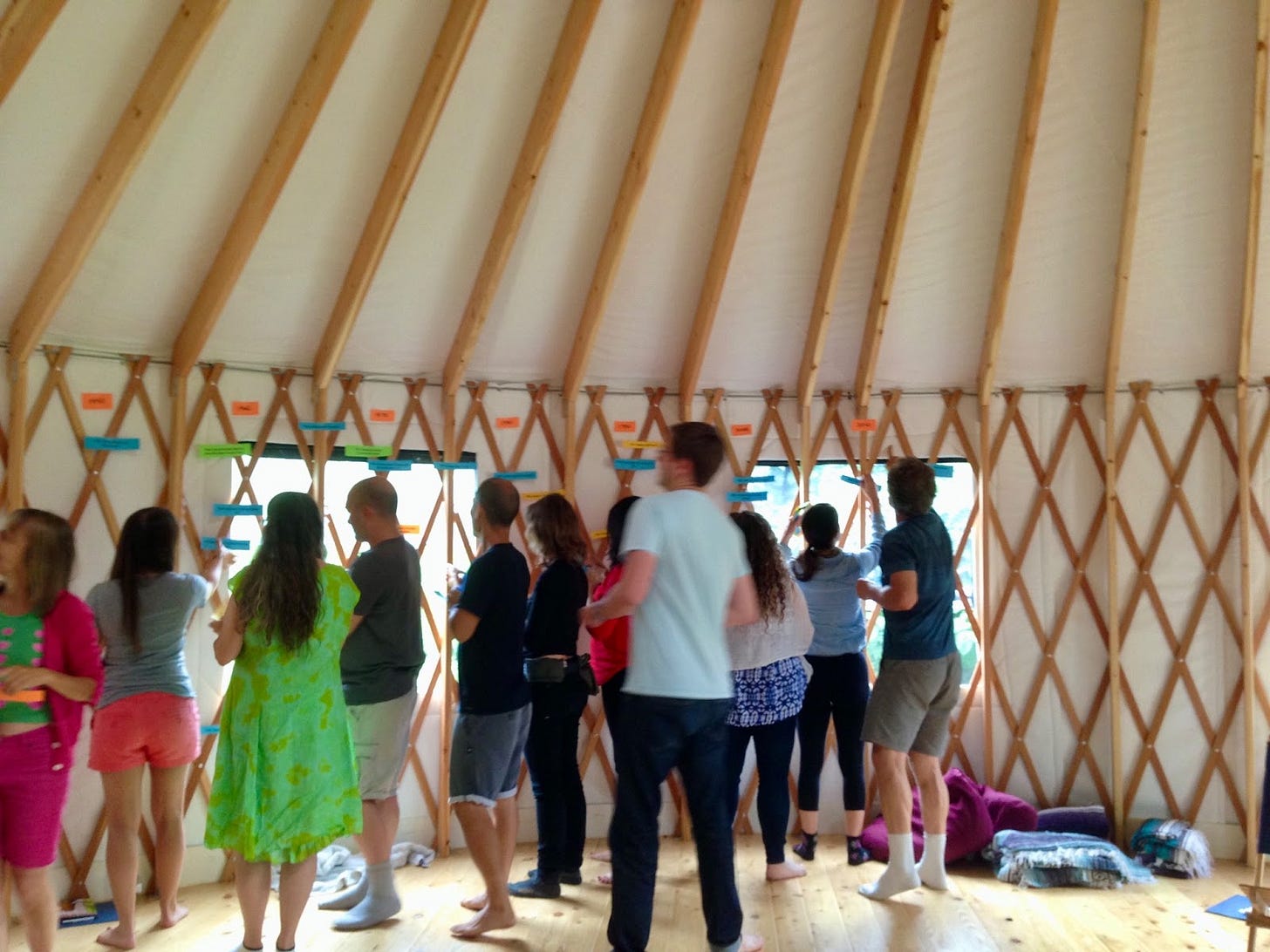
MG: Are there any stories that you want future generations of leftists and wealthy people organizers to particularly know and understand?
LHH: There are so many!
The first thing that comes to mind is that future generations need to understand Billy Wimsatt. Billy is one of the major heroes of the past couple decades in this movement and I hope he goes down in history. He has done more than anyone I know or could even imagine to support the ideas of other people and to encourage their visions and aspirations. He’s an incredible ally.
But perhaps I’ll tell the story of the founding of Way to Win, because it’s also a story about how building a new institution can help shift an ecosystem.
As I mentioned, I was a member of the Democracy Alliance (DA), which was a very important organization in many ways. The DA has done a lot to organize high powered, major dollars, and move political resources. I'm very excited about their new Executive Director, Pamela Shifman. And I think that the DA has shifted away from the critique I’m about to offer, but historically, it had a pretty elitist, white, male dynamic. For example, we heard a lot of complaints from organizations funded by the DA that they were treated as “vendors” to do the donors bidding, rather than as partners who had visions of their own, that were informed by their expertise from the ground.
One time there was this exercise at a DA conference where we were sitting at circular tables and they had a couple of questions for each table to discuss. One of the questions was, “Which do you think is more important to focus on going into 2016, racial justice or electoral politics?”
That's when Tory [Gavito] and Jen [Ancona, co-founders of Way to Win] and I were like, “Oh my gosh, this whole thing is just built on the wrong paradigm.” There seemed to be a lack of understanding among the political establishment that a massive number of Americans are disenfranchised and disempowered by racism, and that questions about race have a huge impact on electoral politics and vice versa. You just can't separate racial justice and electoral politics. Think about the Southern Strategy5 - one of the main tactics used by the Right since the 1960s (but also throughout American history). The Right uses racially divisive language to assemble its base. It’s a fundamental component of American politics.
So it was 2016. The establishment was all in for Hillary. They would never entertain Bernie as a viable candidate. And that was frustrating. There was just this confidence that Hillary was the God ordained next president. Then Trump won. But was there a deep rethinking about our previous assumptions and strategies? Not at all. The same people who led the charge into 2016 pulled together after the election to dictate the way forward, simply blaming their loss on Comey and the FBI (and the fiasco around Hillary’s emails). I was so mad, I rage-wrote an article about this that got published in Politico.
At the next DA conference, the strategy they were laying out for the next period was exactly the same as the strategy going into 2016 - basically, TV ads and a focus on the Midwest, no real attention to the South, to young people, to people of color, to questions of ideology. That's when I started texting some people I saw as allies. We had a text thread with Farhad Ebrahimi, Billy Wimsatt, Tory Gavito, Jen Ancona, Ashindi Maxton, Jason Franklin, and a couple other people who were at the conference. I called an emergency meeting. We left the lecture hall and went into a side room to talk.
It was basically a broom closet. We all squeezed in.
Through that time, between 2012 and 2017, Farhad and I had both been participating in the DA and building Solidaire. The idea was, let's build something on the outside and lets work to also help move this organization from the inside. But after 2017, I felt like we needed a venue to discuss new political strategies and really deal with what was happening in the electoral landscape.
So in that little broom closet, we decided to write up a concept paper for a new political funding vehicle, a new political community.
I wrote the first draft of the concept paper, and Jen and Tory added lots of edits and comments to the google doc. They were just so engaged and brilliant. Tory had the idea of calling for “New Southern Strategy” - a strategy used by the Democratic party that recognized the role of race in politics, and could take back the South. Jen had ideas about messaging and building a narrative shop. We knew we wanted to focus on funding long-term organizing, not just astroturf strategies every two years and bad TV commercials.
Pretty quickly the three of us were building this new thing together. All three of us had other full time jobs. I was still running Solidaire. Tory was running the Texas Donor Table [called the Texas Future Project]. Jen was Vice President of the Women Donors Network. So we just kept hot potato-ing the building of this new institution to each other, each as we could hold it. Then finally, Jen and I both agreed that Tory should be the president. We sat her down and helped her to realize that she could leave her job and take this on, we would raise the money and it would be okay. That was a big leap!
We pretty quickly built a table of supporters like Quinn Delaney, Steve Phillips, Liz Simons, Molly Gochman. It was Quinn Delaney who actually named it. We consulted with tons of state-based groups and partners in the field to understand how the old model was broken, and how to fix it. We would have these small meetings around the country where we would just take a lot of input from these initial donors and partner organizations on how to build it. It was a very collective process.
And then it was off to the races. Alabama Senate elections in 2017: black women, like DeJuana Thompson, were responsible for beating the horrible Republican candidate. National and congressional elections in 2018: Justice Democrats started building the Squad, with our support. And then a full on strategy to flip Georgia and Arizona in 2020, which we did!
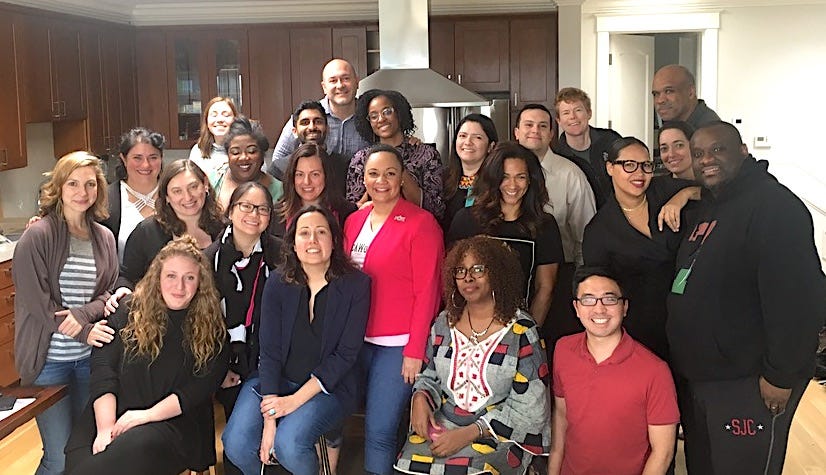
MG: Amazing. I've never heard that story in depth. It's powerful. Thank you for sharing that.
LHH: There was a lot of magic in the collaboration between the three of us - Tory, Jen and I. We're each really different and we each brought something unique and important. It was just a beautiful, beautiful partnership and still is.
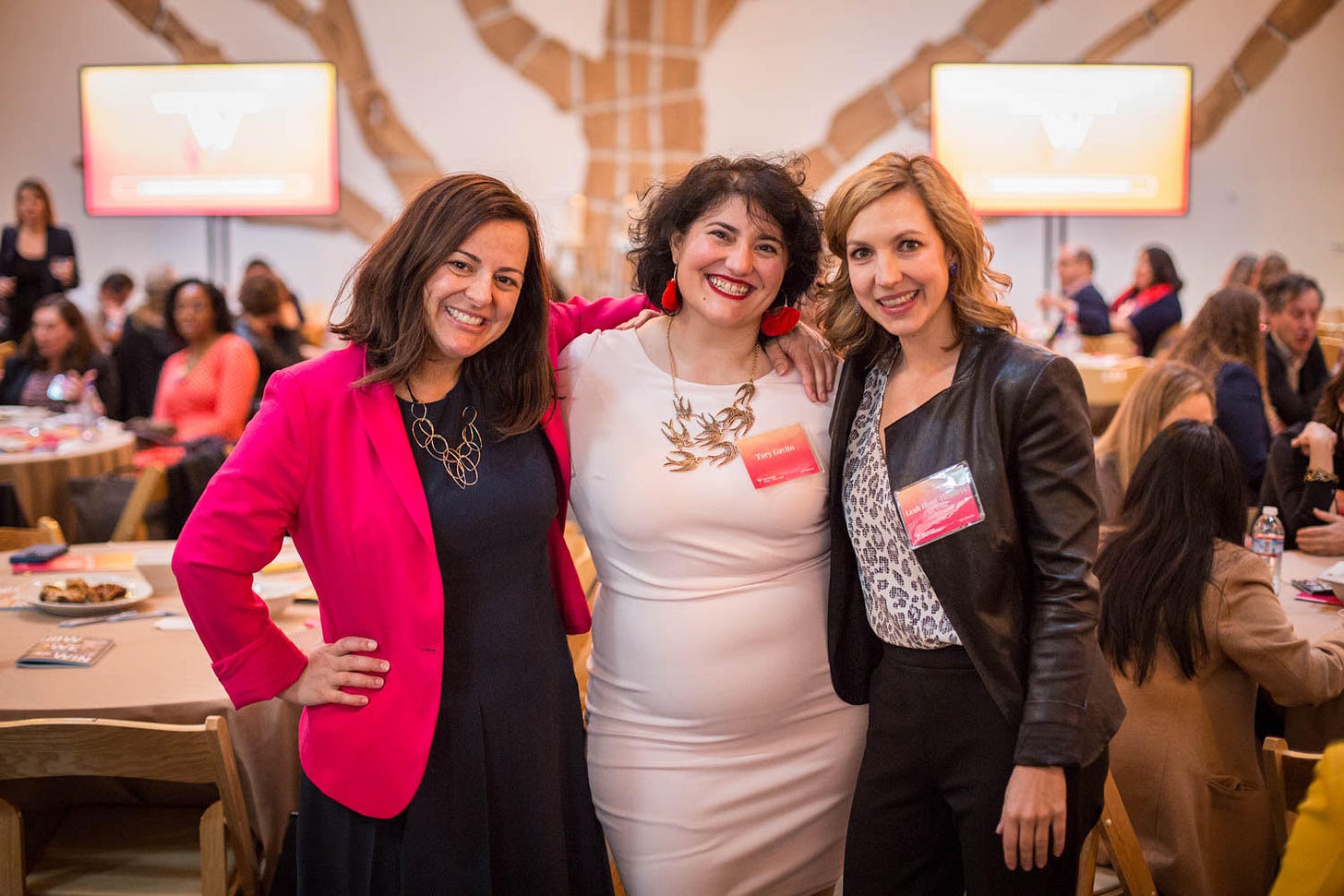
MG: What mistakes did you make that you'd like others to learn from?
LHH: Oh, gosh. Where to begin?
I’ll start with a less vulnerable one – I think there's some balance between fundraising and relational organizing and it's been really hard to get that balance right. By 2022, because of COVID and being unable to see each other in person, I felt like I was ending up too much on the fundraising side of things, only being in touch with people to make an ask. I wish I had spent more time connecting with our Way to Win donor base outside of the urgent need to move money now.
The more vulnerable mistakes for me have been as an organizational founder and staff leader. I was young and didn’t have management experience; I didn’t understand how to build a staff and how to empower them. I hired a multiracial working class staff to run a wealthy donor community and did not anticipate or fully understand the complexities of that. I’ve learned that it can be really hard for people and hard on people, especially if you’re not white or wealthy and are experiencing racism and classism all the time in your work with the donors.
Another challenge I’m still figuring out is about boundaries. I gave a lot of myself the past ten years. All the extra rooms in my house were full of activists and colleagues and friends. Constantly. Let me be clear, I love doing that. But figuring out boundaries is tricky. Where does my responsibility to give start and end? Where can I give myself permission to say “no”?
I think that's probably something a lot of us learn as we get older, and that I’m certainly working on. It’s definitely a topic and skill I think anyone in this work needs to really reflect on.
—------------------
This marks the end of Part 1. Thank you Leah!
Looking forward to sharing Part 2 soon, with Leah’s assessments of the current moment in rich people organizing, the need to more fully back unions and the labor movement, and honest reflections on the challenges of being a public face for wealthy progressives.
Leah has shared her story with the press and has had pieces written about her in major publications, like the Wall Street Journal, New York Times and Salon.com. She has attempted to use the media’s fascination with the wealthy to promote the organizations and movements she’s been a part of. This type of media attention is quite challenging. Leah and I talk more about that part of her work in the second half of this interview.
Leah’s mom, Helen LeKelly Hunt, is a powerhouse wealthy donor organizer, one of the early supporters of the women’s funding movement, co-founding The Dallas Women’s Foundation, The New York Women’s Foundation, The Women’s Funding Network, and Women Moving Millions.
FNTG was a philanthropic intermediary that worked alongside the global justice movement for many years, moving wealthy individuals and foundations to support people’s movements primarily in the Global South. FNTG turned into EDGE Funders (Engaged Donors for Global Equity).
A major player in the history of coal mining, he was the driving force behind the founding of the Congress of Industrial Organizations (CIO), which established the United Steel Workers of America and helped organize millions of other industrial workers in the 1930s, during the Great Depression. After resigning as head of the CIO in 1941, Lewis took the United Mine Workers out of the CIO in 1942 and in 1944 took the union into the American Federation of Labor (AFL).
The Southern strategy was a Republican Party electoral strategy to increase political support among white voters in the US South by appealing to racism against African Americans.




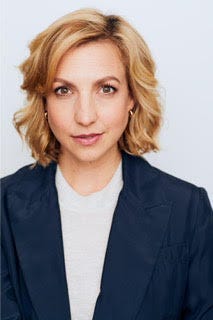
Thanks for taking time to tell this story Mike. Quite a journey, and quite relevant
Thank you for this article. Very helpful to read.